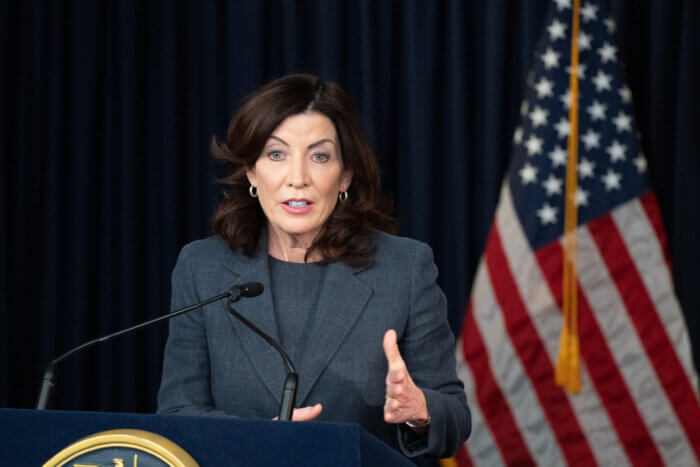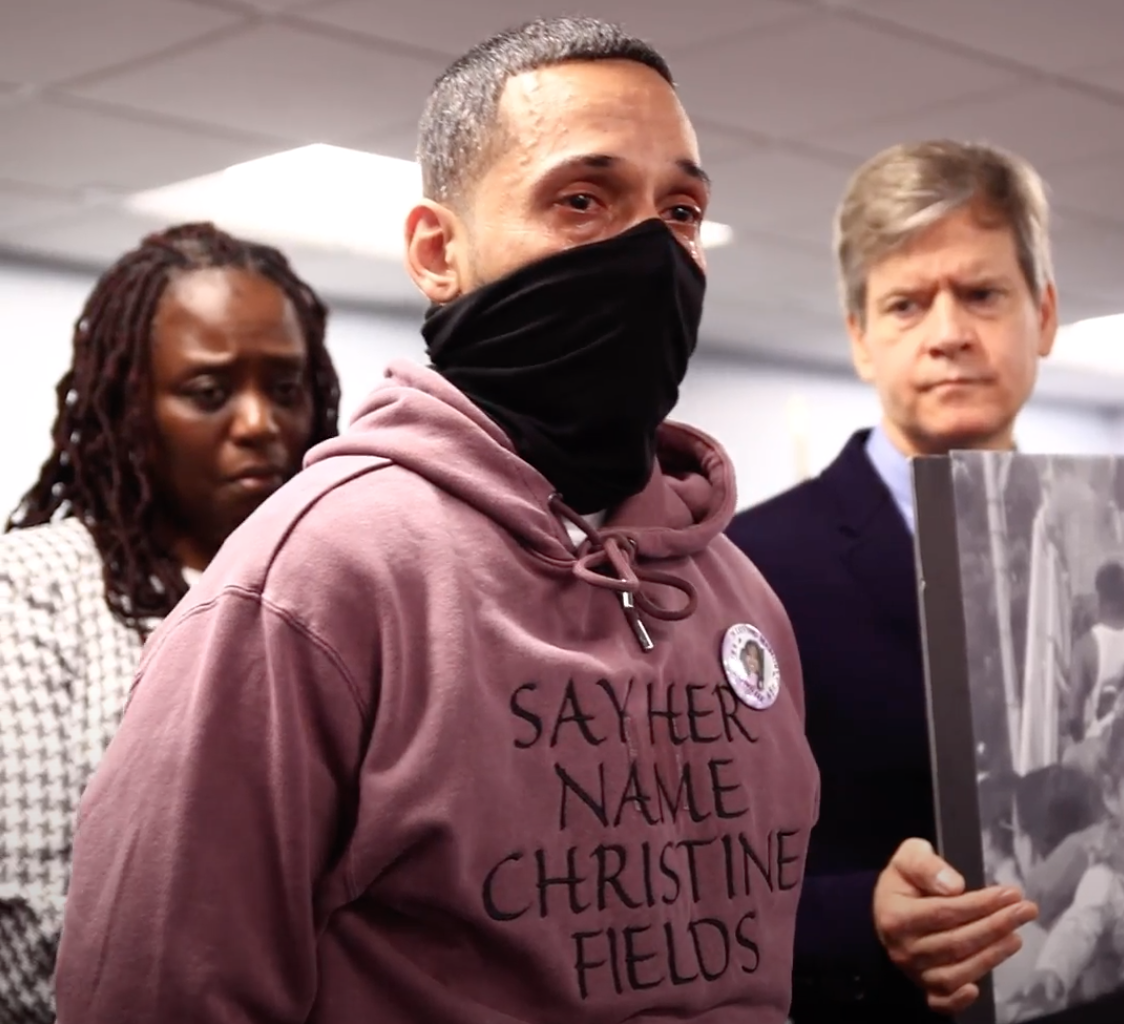A grieving father who lost his fiancée after childbirth at Woodhull Hospital is advocating to reform of the state’s Grieving Families Act after Gov. Kathy Hochul vetoed the bill for a second time.
A new bill seeking to revamp the Grieving Families Act would allow families looking for compensation following a wrongful death to seek damages for grief and anguish, not just financial loss, as the law currently allows.
The proposed bill, introduced by state Sen. Brad Hoylman-Sigal, describes the existing Grieving Families Act as “a wrongful death statute that is over 170 years old, and sadly out of step with our sister states,” which “prohibits the grief-stricken family from recovering damages for their emotional suffering from the wrongdoer.”
Jose Perez and his family have been rallying outside the Bed-Stuy hospital weekly since Christine Fields, his fiancé and the mother of his child, died suddenly after delivering via C-section on Nov. 12. Perez says doctors never gave him and his family an official reason for Field’s death, making him feel alone in his quest for justice.
“The trauma we go through, it doesn’t go away quickly. It’s not something that just goes away,” he told Brooklyn Paper. “I just feel empty. I just feel lonely.”

Fields had a birth plan and a healthy relationship with her midwife before her death, Perez said.
He told Brooklyn Paper the family went to the hospital on Nov. 12, because Fields was in pain and thought she was in labor, but returned home later that afternoon after a nurse was rude to them. They returned to the hospital later that night because Fields was still in pain, and were told the baby was in distress. Perez said that Fields said she did not want a c-section, but was taken to a surgery room for the procedure.
Following her surgery, Perez said his fiancée didn’t look like herself. He notified nurses who soon called a Code Blue. A few hours, later a nurse told the family Fields had passed away — however, Perez said they never got details on the events leading to her death or were told an official cause of death.

American College of Obstetricians and Gynecologists bereavement policies call for a sit-down meeting with the patient’s family to present the facts surrounding the events and “explain the process for any analysis of the adverse event.”
Katy Cecan, a former NICU nurse with SUNY Downstate Health Sciences University, said it is crucial for hospitals to have those meetings with families and obstructing information can cause additional grief.
“To refuse a family information about their loved one’s final moments on earth contradicts both medical standards and basic morality,” Cecan said. “That this much time has passed with no answers is a second trauma and injustice and speaks volumes about system-wide issues with New York State hospitals and their ability to provide true care to their patients and community.”
New York Health+Hospitals/ Woodhull did not respond to Brooklyn Paper’s request for comment.
Families frustrated after second veto
Hochul vetoed the updated Grieving Families Act for the first time at the beginning of 2023. After the governor vetoed an updated version of the bill on Dec. 29, Perez and other families who have experienced the same kind of trauma — including Mandy Fletcher, the mother of the late Maison Callender; Shawnee Benton Gibson, whose daughter passed due to childbirth complications; and Bruce McIntyre, whose partner died in childbirth — called out the politician in a joint statement for refusing to sit down with them.
“Governor Hochul promised to work collaboratively toward ‘holistic solutions’ on the grieving families act; why then did she veto the bill 30 days before the deadline after purposefully refusing to meet with us,” the statement said. “We feel she has further dishonored the memory of our loved ones, who died by hospital negligence, by refusing to hear from us while acting upon the wishes of the very hospital corporations that killed them.”
@GovKathyHochul, we know you have met with medical & insurance industry special interests. We believe you have a duty to all grieving NYers to hear our stories too.
Gov Hochul, please meet with us & sign the #GrievingFamiliesAct today. pic.twitter.com/wq115gr4PY
— saveArose Foundation (@savearose) December 22, 2023
Prior to her decision to veto, Hochul offered a counter-proposal to the law that was reportedly rejected by state lawmakers. Hochul has cited increased insurance rates, broad definitions of “close family”, concerns of retroactivity and other unintended consequences as her reasons for denying the bill, as reported by City and State.
The governor’s office did not respond to Brooklyn Paper’s request for comment.

Sabrina Rezzy, communications director for the New York State Trial Lawyers Association and a spokesperson who is working with the families to advocate for the Grieving Families Act, said deaths like Fields’ are perpetuated by a lack of accountability and a law that neglects previously disadvantaged communities.
“The law as it is written disenfranchises people who aren’t wealthy. Although Christine’s life is priceless to her family, and she had just obtained a college degree, the 1847 statute only values the already established. The grieving families act would appropriately right this wrong,” Rezzy said. “There’s a black maternal mortality epidemic and the ZIP code you live in can determine the care you receive. The law as it is accentuates those disparities, by removing financial deterrents for patient safety.”
According to city data, the pregnancy-related mortality ratio for Black women in New York City is more than nine times that for white women. In 2020, there were 51 pregnancy-associated deaths or deaths that occurred while pregnant or within one year from the end of pregnancy — 29 of which were pregnancy-related deaths that were directly due to a pregnancy complication. Pregnancy-related deaths are a subcategory of pregnancy-associated deaths.
Reports show 27.4% of these deaths took place in Brooklyn resulting in beefed-up efforts to deter maternal deaths from Brooklyn Borough President Antonio Reynoso, including a maternal resource guide, health expo and capital funding towards maternal health centers.
Conversation around the bill will continue as legislators plan to reintroduce the bill next session, however Perez said lawmakers need to meet with the families to hear their stories beforehand.
“I’m not stopping,” he said. “They’re missing the sit-down we’re asking for. They’ll sit down with the hospitals. They’ll sit down with insurance companies but they don’t sit down with the family.”
(Update 1/8/2024 at 1:38 p.m.): This story has been updated to add comment from Katy Cecan and additional details regarding Sabrina Rezzy’s title.
























